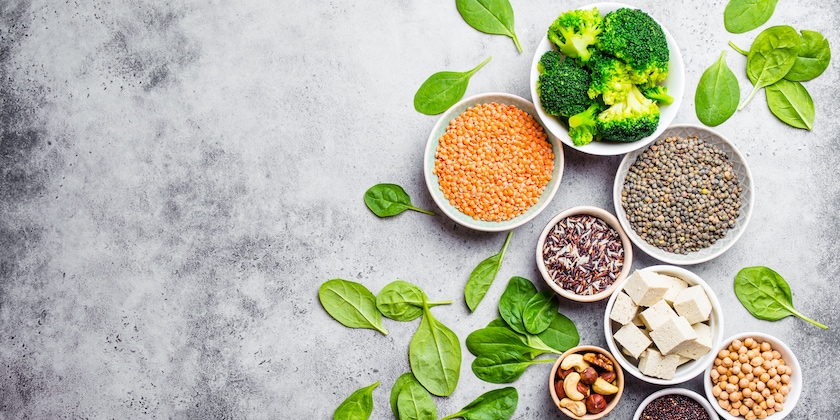If you’ve been in the diet and exercise game for any length of time you’ve no-doubt run into this buzzword: protein. People always ask if you’re getting enough protein. Or, if you subscribe to a vegan lifestyle, offer up concern about whether or not you’re getting the protein you need to maintain a healthy lifestyle.
Protein is touted throughout the industry as the key to toning well, building muscle, and staying health. But how much protein do you actually need?
The answer?
Less than you think. Let’s dive into what exactly protein is, what it does, and why the idea that those of us who opt for plant-based its aren’t getting enough simply isn’t true.
What is it anyways?
Every cell in your body is made up of protein, from the top of your head to the tips of your toenails.
Protein places a key roll in building up and repairing muscle issue, and is the base building block of your bones, skin, and blood (all very important things). Your hormones, enzymes, and other chemical processes rely on protein to be carried out efficiently.
Let’s be clear; protein is definitely important to maintain normal bodily function.
However, our culture in recent years has become obsessed with protein, leading to an over-abundance of protein in many people’s day-to-day diets.
Why is this? Well, think of protein as amino acid instead (the building block of proteins). In this scenario, amino acids are found in all foods (not just meat or cheese)! This is what helps us dispel the false idea that those who follow vegetarian or vegan diets are at a disadvantage when it comes to getting adequate nutritional protein.
How Much Do You Actually Need?
In reality, the average person only needs around 0.36 grams of protein per pound of weight. This equates to about 56 grams daily for men and 46 for women. That being said, most people (especially those who don’t follow plant-based diets) end up taking in nearly twice that amount.
Active adults (possibly you!) require slightly more protein, with endurance athletes needing roughly .57 grams per pound and strength trainers requiring between 0.63 and 0.81 per pound. Still, most peoples diets provide ample amounts of protein to sustain these numbers.
So what exactly has led to this popularization of protein in modern culture?
Let’s check it out.
The Rise of Protein Culture
Since 2008 the number of high-protein food items on the market as increased by 54%. But according to an NPD survey, 71% of consumers don’t actually know how much protein they need in their diets.
So what’s led to this protein craze? While it’s impossible to pinpoint an exact what kicked off this trend toward protein, the rise of Paleo, Atkins, and other low-carb-high-protein diets has boosted proteins favor in the public eye.
Like most diet fads, though, experts predict that this protein craze may stick around far longer than the war on fat in the 80’s and 90’s. This is because unlike other trends, the protein fad focuses on consumption rather than restriction.
Can Protein Lead to Weight Loss?
The million dollar question.

Contrary to popular belief, high-protein consumption does not automatically always lead to loss of mass or body fat.
Protein is often touted as a weight-loss miracle because of how satiating it can be. While it’s true that protein can fill you up quicker than other foods, which can reduce snacking, feeling full for longer isn’t a fool-proof way to loose weight. Weight loss is a combination of both diet and exercise, often accompanied by a mind caloric deficit.
In short?
No protein won’t immediately make you loose weight. But, it can keep you full, which can help you maintain a caloric deficit which can.
Plant-based Protein Sources
Often when we hear about protein in our diets we are bombarded with facts and figures about how satiating meat and cheese are. What we aren’t told is how high these protein sources are in saturated fat, which has been linked to diabetes, heart disease, and other chronic health issues.
But fear not!
There are tons of protein-rich, plant based foods that bring you the satiation of protein without the high saturated fat count of animal-based foods.
Some great vegan sources of protein include:
- Seitan
- Tofu
- Beans
- Nuts, and
- Seeds
We hope this was an informative breakdown on how much protein you actually need and some great, plant-based ways to get it. For more on nutrition and health living read our blog on The Benefits of a Vegan Or Plant-Based Diet and Why You Need Carbs!

